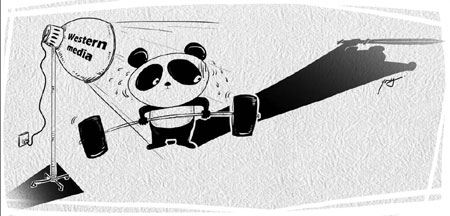Defense white paper appreciated
By Tom Plate (China Daily) Updated: 2011-09-21 07:54
|
Wang Xiaoying / China Daily |
Despite everything it writes and proclaims, modern-day China, it still seems to me, continues to search for a sense of its true self and its proper place in the 21st century.
Where and how this otherwise predictable rapidly developing power will fit into the scheme of things on this troubled planet is a question of the country's more than 1.3 billion people.
Chinese leaders repeatedly deny that their country of many storied millennia has any ambition whatsoever to mushroom into a dragon-like hegemony. But precisely that scenario has been the consistent pattern of rising and ambitious nations throughout history.
Yet China, we are told by China, will be different.
But will it? And indeed, why should it be different from any other potent power in the course of history?
Still, a newly re-proclaimed sense of defined difference was the urgent message under conveyance in an extraordinary white paper issued on Sept 6 by the Information Office of the State Council of the People's Republic of China.
The State Council, roughly equivalent to the US Cabinet, issues all sorts of statements and documents. And you can forget about most of them. But this one was different. It was nearly 9,000 words long and despite the title, "China's Peaceful Development", it was aimed at shooting down any suspicion or worry that China is trying to become a military power.
Here is a typical thematic statement from the State Council opus: "China's peaceful development has departed from the traditional pattern where a rising power was bound to see hegemony. China does not seek regional hegemony or a sphere of influence, nor does it want to exclude any country from participating in regional cooperation. China's prosperity, development and long-term stability represent an opportunity rather than a threat to its neighbors."
The very fact that the State Council set out to impart such a self-justifying "state of the Chinese union" address to the world is revealing in itself. It tells us that it is worried that its past promises of "peaceful rising", repeated many a time, have not been received with universal trust.
The pointed and panoramic text was made instantly public in English as well as Chinese. English availability was widespread on the Internet, and China Daily, the country's national English-language newspaper, added analysis as well as commentary to the word-for-word translation.
An extra point about China Daily needs to be made. No other newspaper available to the West so well reflects Beijing's world-view, and as China's growth to "superpower" status proceeds apace, understanding those views (while not necessarily accepting them, to be sure) is vital to improving Sino-US relationship.
In China Daily's main story, Wang Yizhou, associate dean of the School of International Studies at Peking University, was quoted as admitting to nationalistic pressures within China that would prefer a less peaceful rising. "Some domestic voices argue China should be more aggressive in the international arena", the paper quoted Wang as saying. But that view is not correct, he insisted, as the new white paper "tells the public that China should remain modest and prudent in its diplomacy".
Of course, it will be deeds, and not so many words, that will in the end define China's image in the world. However, just a statement won't bring much change to many existing disputes, and it's inevitable that controversies will exist. So naturally China's views on international disputes will not always be well accepted, which may sound harsh but is reality.
For instance, China puts integrity of territory as its national core interest, but in the South China Sea dispute, its neighbors believe that they have their own sincere and indeed urgent interests to protect. The US, whatever its newly discovered financial predicament and no matter whether the Chinese like it or not, is not going to withdraw from Asia and its oceans.
So finding ways through the thorny maze will be a truly hard task for China to realize its goal of peaceful development.
China must keep its militarists and military at bay - a chore we in the US have as well. Otherwise, there is going to be trouble that inevitably both sides will profoundly regret. The State Council's own wise warning on this point was extremely well taken - and, in fact, much appreciated.
The author is a veteran journalist and professor of Asian and Pacific Studies at Loyola Marymount University in Los Angeles.
(China Daily 09/21/2011 page9)












